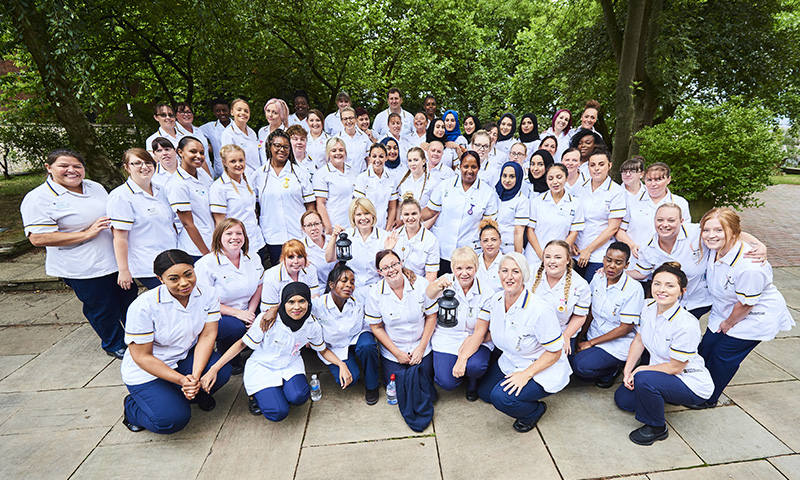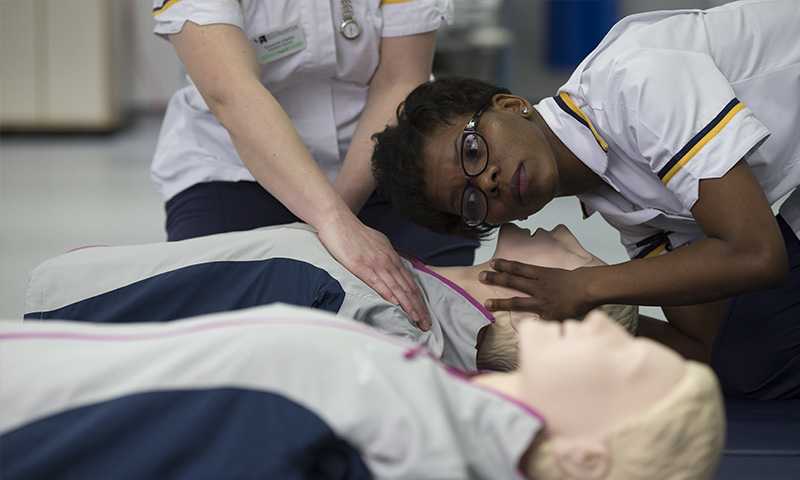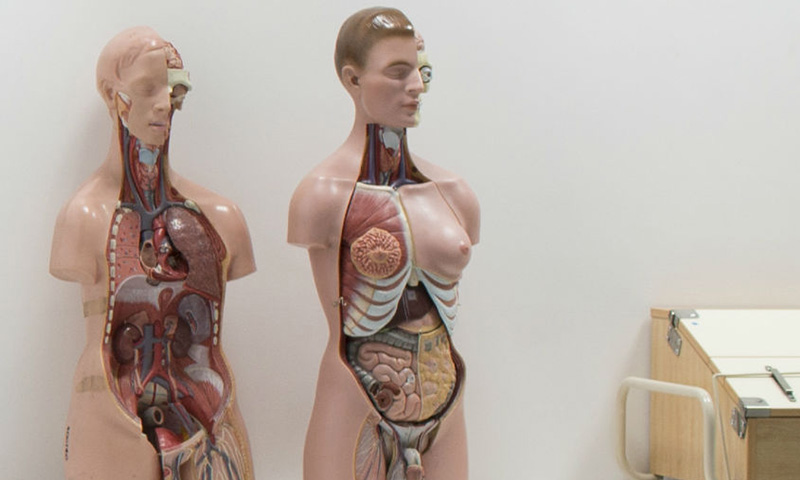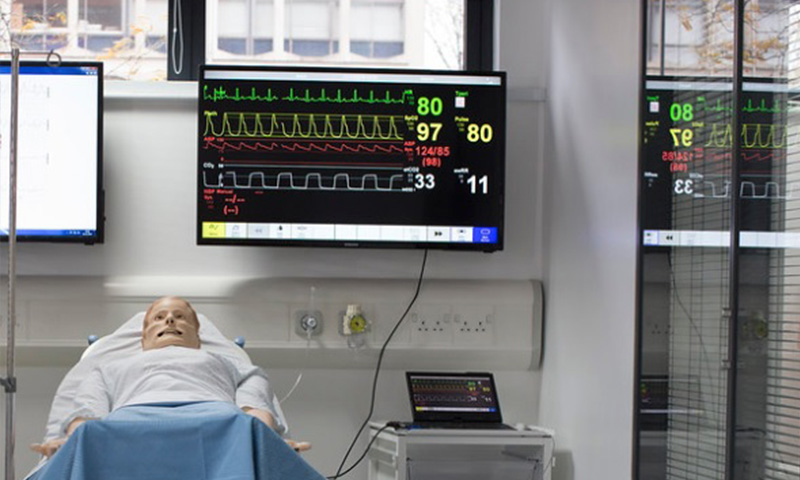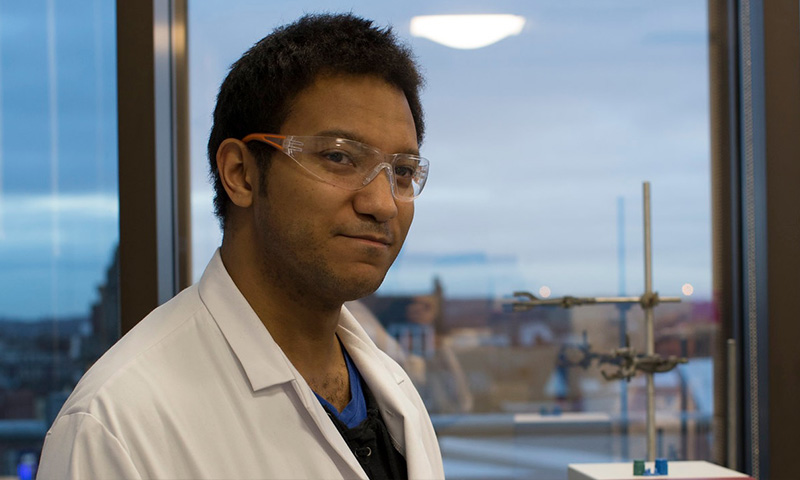
The health and social care sector
The health and social care industry provides vital services and care to vulnerable, injured, or ill people throughout society. The courses we provide in this area include qualifications in social work, nursing, midwifery, paramedic science, physiotherapy, and more.
Carving a career in health and social care means that you will earn your wage by helping people who need assistance, as well as entering an industry filled with varied roles and fulfilling opportunities.
There’s lots of crossover within the sector, with staff working together or even working roles that cover both health and social care. The UK’s social care sector employs over 1.5 million people, while the health sector also employs over 1.5 million, with over 350 different roles available in the NHS alone.
Social care is a catch-all term for “personal care given by public or private organisations to help people in society who need specialised assistance to live a comfortable, healthy, fulfilling life.” Most people working in social care are office-based, but may need to visit clients at places such as care homes, hostels, prisons, homes, schools, and more.
Healthcare describes a sector with a range of careers covering all aspects of health-related industries in the UK, including nursing, midwifery, dentistry, optometry, pharmacy, and more. There are numerous independent healthcare organisations in the private sector and a significant number of health workers are employed by these companies and increasingly contracted out to the NHS.
Types of careers in Health and Social Care
There are many different careers involved in the Digital and Cyber industry, so the roles listed are not extensive.
An adult nurse learns to observe and assess the needs of their patients, delivering the most appropriate care for them, and evaluating the results.
Social workers help to protect and support vulnerable children and adults. This could include providing support plans for clients, advising and counselling, keeping records and writing reports, reviewing situations and more.
Physiotherapists help patients to extend their range of movements, often helping them recover from accidents or injuries, working with children who have disabilities, and helping older people with physical struggles to move more easily.
Paramedics respond to emergency calls, assess scenes on-scene where emergencies have taken place, help to stabilise or revive patients, and more.
An occupational therapist provides support to people whose health is making activities that are important to them difficult or impossible. This could include rehabilitation after a stroke causes physical difficulties, helping people with learning difficulties to be more independent, encouraging someone with depression to try a new activity.
The number of disabled younger adults living longer and the number of older people needing care means that adult social care in particular is growing, and the sector is likely to need at least another half a million employees by 2030.
There are over 100,000 vacancies at any time in the health and social care sector, and with the sector’s predicted growth over the next decade, there are many jobs available for those dedicated to careers in this area.
In 2020, the health and social care sector accounted for 8.3% of the total gross added value (GVA), or £1.2 billion, of the area known as the Marches, which incorporates Herefordshire, Shropshire, and Telford & Wrekin.
The Marches has a wide stretch of rural and ageing communities, requiring approximately 40,900 health and social care jobs, or 14.1% of the total jobs, which is the third highest sector in the region. The health and social care sector here was predicted to increase by around 1,150 jobs by 2022, showing that the regional area’s requirements for qualified employees is rising.
The Royal College of Nursing’s West Midlands regional director Lindsay Meeks reported in April 2022 that there are nearly 8,000 vacancies for NHS nurses across the Midlands. This is the equivalent to one in nine posts – a number which has barely changed in the past four years, so demand for qualified nurses remains high.
/prod01/wlvacuk/courses/media/images/2019-re-design/large-cta-image/burton-open-day-cta-banner.jpg)
Case Studies
Our expertise
We have a proud history at the University of Wolverhampton to responding swiftly to the needs of the health and social care sector, providing excellently qualified, well-trained professionals to support some of the most vulnerable people in society, as well as regularly publishing life-changing research that has real-world impact worldwide.
Course in healthcare are some of our most popular, and our provision for the subject area reflects this. Our extensive facilities support all aspects of trainee learning, and include:
- clinical skills laboratories providing a safe, non-threatening environment for teaching and practice
- simulated ward environments for teaching and practising clinical skills
- a purpose-built house for students to practise role-play scenarios
- a wide range of general ward equipment and high-tech devices.
Many of our health-related courses are accredited, approved, or endorsed by professional bodies, including the Nursing and Midwifery Council (NMC), Health and Care Professions Council (HCPC), the General Pharmaceutical Council (GPhC) and many more.
Our social care and social work courses are enhanced by the real-life experiences of our SUCCESS team (Service users and carers contributing to educating students for services). Our Social Work course is also validated and accredited by Social Work England.
The facilities across all sites are tailored to the needs of students, and our newest building at our Telford Campus, the Marches Centre of Excellence for Health and Social Care was awarded “Best Project Delivering Social Value” at the Pagabo Awards 2022.
Our Courses
Our links with industry
The University supplies a large proportion of healthcare workers across the West Midlands, with strong links with the industry, partnerships, and close working with organisations.
The University has been in partnership with Wolverhampton NHS Trust since 2004, and through this partnership the Royal Wolverhampton NHS Trust offers placements for students studying specific courses, including our nursing and midwifery courses.
This partnership also saw the University and the Trust undertake a co-production project co-designed by patients and clinical staff, as yet another demonstration of our close relationship with local healthcare industry.
IN 2018, the University and West Midlands Ambulance Service (WMAS) formed a ground-breaking new partnership to create the UK’s first university ambulance trust. The new West Midlands Ambulance Service University NHS Foundation Trust (the first of its kind in the country) allows us to work together even more closely on collaborative projects, sharing clinical expertise, joint curriculum development and staff exchanges, as well as develop courses and research in the area of emergency management and resilience.
World Class Facilities
World Class Facilities
Our Courses
FAQs
Your FAQs about pursuing a career in Health and Social Care.
For many careers in healthcare you will need to be a registered healthcare professional, while it is possible to enter a social care via an apprenticeship, work experience, or by qualifying in a relevant subject.
In social care, there are numerous graduate-level roles available where it is not always necessary to have studied a specialised subject; however, applicants are likely to be considered to be more dedicated to the area if they have already studied a relevant degree or qualification. Places for degrees in social work are often very competitive.
For most careers in healthcare, you will be required to be a registered healthcare professional, as regulated by the Health and Care Professions Council (HCPC).
Most health-based degrees require applicants to have GCSEs in English, Mathematics and Science.
For any health-based degree or career working with vulnerable people, you will likely need to pass a DBS (Disclosure and Barring Service) check. There are several levels of DBS check, which may give details of any convictions, cautions, reprimands and final warnings held by the police about you.
If you are a caring person, great interpersonal skills, and a genuine passion, a career in these areas can be highly rewarding. You will dedicate yourself to the care of vulnerable people, and finish each day knowing that you have helped those who most need it. Work in both areas is varied and your days will rarely be the same, as every situation and every client or patient will be different.
The amount of experience you need to enter the sector depends on the role you are hoping to enter. Most degree courses have a large amount of hands-on work experience and built-in placements as an integral part of the course. If you’re applying for a degree, there are lots of opportunities to gain valuable work experience to include on your application.
There are many ways you can gain experience in the sector. These include:
- work experience placements
- volunteering
- a supported internship
- caring for a friend or relative who is unwell or disabled
- paid part or full-time work, eg. in a care home
You may be able to volunteer through NHS Jobs, a scheme such as the Duke of Edinburgh Award, or through a charity or voluntary organisation. If you are studying a related qualification with the University of Wolverhampton, you will be able to gain help to find a placement through our Careers team.
The number of disabled younger adults living longer and the number of older people needing care means that adult social care in particular is growing, and the sector is likely to need at least another half a million employees by 2030.
There are over 100,000 vacancies at any time in the health and social care sector, and with the sector’s predicted growth over the next decade, there are many jobs available for those dedicated to careers in this area.


/prod01/wlvacuk/media/departments/digital-content-and-communications/images-2024/Diane-Spencer-(Teaser-image).jpg)
/prod01/wlvacuk/media/departments/digital-content-and-communications/images-18-19/220325-Engineers_teach_thumbail.jpg)
/prod01/wlvacuk/media/departments/digital-content-and-communications/images-2024/241024-Dr-Christopher-Stone-Resized.jpg)
/prod01/wlvacuk/media/departments/digital-content-and-communications/images-2024/UoW-City-Campus-(Teaser-Image).jpg)
/prod01/wlvacuk/media/departments/digital-content-and-communications/images-2024/241014-Cyber4ME-Project-Resized.jpg)
/prod01/wlvacuk/media/departments/digital-content-and-communications/images-2024/240315-Research-Resized.jpg)
/prod01/wlvacuk/media/departments/digital-content-and-communications/Khabat-Jamel-and-Dr-Gupta.jpg)
/prod01/wlvacuk/courses/media/images/2019-re-design/video-banner/Health-and-Social-Care-banner.jpg)










